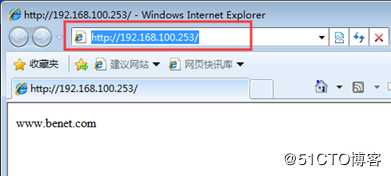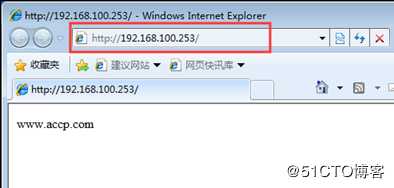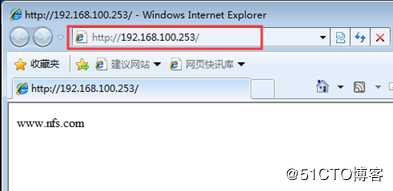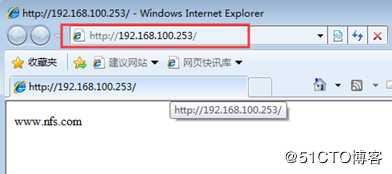标签:自动启动 允许 end 图片 arp href 详细 can 物理
关于LVS负载均衡工作原理及其概述请访问:Centos 7之LVS负载均衡群集关于地址转换(NAT)模式的负载均衡群集详细配置请访问:构建基于地址转换(LVS—NAT)模式的负载均衡群集
准备工作:
Centos 7操作系统四台;
Centos01模拟Web1服务器:IP地址/192.168.100.10
Centos02模拟Web2服务器:IP地址/192.168.100.20
Centos03模拟NFS服务器: IP地址/192.168.100.30
Centos05模拟LVS服务器: IP地址/192.168.100.50
Windows 客户端一台;
[root@centos05 ~]# cp /etc/sysconfig/network-scripts/ifcfg-ens32
/etc/sysconfig/network-scripts/ifcfg-ens32:0 <!--复制网卡配置文件-->
[root@centos05 ~]# vim /etc/sysconfig/network-scripts/ifcfg-ens32:0
<!--配置VIP地址网卡,设置VIP地址为192.168.100.253-->
TYPE=Ethernet
PROXY_METHOD=none
BROWSER_ONLY=no
BOOTPROTO=static
DEFROUTE=yes
NAME=ens32:0 <!--修改名字-->
DEVICE=ens32:0 <!--修改名字-->
ONBOOT=yes
IPADDR=192.168.100.253 <!--修改IP地址-->
NATEMASK=255.255.255.0
[root@centos05 ~]# systemctl restart network <!--重启网卡服务-->
[root@centos05 ~]# ifconfig <!--查看是否配置成功-->
ens32: flags=4163<UP,BROADCAST,RUNNING,MULTICAST> mtu 1500
inet 192.168.100.50 netmask 255.255.255.0 broadcast 192.168.100.255
inet6 fe80::20c:29ff:fe16:c54b prefixlen 64 scopeid 0x20<link>
ether 00:0c:29:16:c5:4b txqueuelen 1000 (Ethernet)
RX packets 2795 bytes 1095013 (1.0 MiB)
RX errors 0 dropped 0 overruns 0 frame 0
TX packets 1371 bytes 182001 (177.7 KiB)
TX errors 0 dropped 0 overruns 0 carrier 0 collisions 0
ens32:0: flags=4163<UP,BROADCAST,RUNNING,MULTICAST> mtu 1500
inet 192.168.100.253 netmask 255.255.255.0 broadcast 192.168.100.255
ether 00:0c:29:16:c5:4b txqueuelen 1000 (Ethernet)[root@centos05 ~]# vim /etc/sysctl.conf
<!--修改LVS服务器的内核配置文件支持DR模式-->
net.ipv4.ip_forward = 1
net.ipv4.conf.all.send_redirects = 0
net.ipv4.conf.default.send_redirects = 0
net.ipv4.conf.ens32.send_redirects = 0
[root@centos05 ~]# sysctl -p <!--刷新-->[root@centos05 ~]# modprobe ip_vs <!--加载ip_vs模块-->
[root@centos05 ~]# yum -y install ipvsadm <!--安装ipvsadm工具-->
[root@centos05 ~]# ipvsadm -C <!--清除原有策略-->
[root@centos05 ~]# ipvsadm -A -t 192.168.100.253:80 -s rr <!--配置调度服务器IP地址-->
[root@centos05 ~]# ipvsadm -a -t 192.168.100.253:80 -r 192.168.100.10:80 -g -w 1
<!--添加物理服务器-->
[root@centos05 ~]# ipvsadm -a -t 192.168.100.253:80 -r 192.168.100.20:80 -g -w 1
<!--添加物理服务器-->
[root@centos05 ~]# ipvsadm-save > /etc/sysconfig/ipvsadm <!--导出策略备份-->
[root@centos04 ~]# ipvsadm -ln <!--确认群集当前策略-->
IP Virtual Server version 1.2.1 (size=4096)
Prot LocalAddress:Port Scheduler Flags
-> RemoteAddress:Port Forward Weight ActiveConn InActConn
TCP 192.168.100.253:80 rr
-> 192.168.100.10:80 Route 1 0 0
-> 192.168.100.20:80 Route 1 0 0 [root@centos01 ~]# yum -y install httpd <!--安装http服务-->
[root@centos01 ~]# echo "www.benet.com" > /var/www/html/index.html
<!--准备测试网页,等看到负载均衡的效果后,再挂载共享存储设备-->
[root@centos01 ~]# systemctl start httpd <!--启动http服务-->
[root@centos01 ~]# systemctl enable httpd <!--设置为开机自启动-->
[root@centos01 ~]# cp /etc/sysconfig/network-scripts/ifcfg-lo
/etc/sysconfig/network-scripts/ifcfg-lo:0 <!--生成虚拟网卡-->
[root@centos01 ~]# vim /etc/sysconfig/network-scripts/ifcfg-lo:0
<!--编辑虚拟网卡监听地址为lvs服务器的VIP地址-->
DEVICE=lo:0
IPADDR=192.168.100.253
NETMASK=255.255.255.255
ONBOOT=yes
[root@centos01 ~]# systemctl restart network <!--重启网卡服务-->
[root@centos01 ~]# ifconfig <!--查看配置是否生效-->
lo:0: flags=73<UP,LOOPBACK,RUNNING> mtu 65536
inet 192.168.100.253 netmask 255.255.255.255
loop txqueuelen 1 (Local Loopback)
[root@centos01 ~]# vim /etc/sysctl.conf <!--修改web服务器ARP响应-->
net.ipv4.conf.all.arp_ignore = 1
net.ipv4.conf.all.arp_announce = 2
net.ipv4.conf.default.arp_ignore = 1
net.ipv4.conf.default.arp_announce = 2
net.ipv4.conf.lo.arp_ignore = 1
net.ipv4.conf.lo.arp_announce = 2
[root@centos01 ~]# sysctl -p <!--刷新-->[root@centos02 ~]# yum -y install httpd <!--安装http服务-->
[root@centos02 ~]# echo "www.accp.com" > /var/www/html/index.html
<!--准备测试网页,等看到负载均衡的效果后,再挂载共享存储设备-->
[root@centos02 ~]# systemctl start httpd <!--启动http服务-->
[root@centos02 ~]# systemctl enable httpd <!--设置为开机自启动-->
[root@centos01 ~]# scp /etc/sysctl.conf root@192.168.100.20:/etc/
<!--拷贝第一台web服务器/etc/sysctl.conf配置文件到第二台web服务器的/etc/目录下-->
The authenticity of host ‘192.168.100.30 (192.168.100.20)‘ can‘t be established.
ECDSA key fingerprint is SHA256:PUueT9fU9QbsyNB5NC5hbSXzaWxxQavBxXmfoknXl4I.
ECDSA key fingerprint is MD5:6d:f7:95:0e:51:1a:d8:9e:7b:b6:3f:58:51:51:4b:3b.
Are you sure you want to continue connecting (yes/no)? yes
Warning: Permanently added ‘192.168.100.20‘ (ECDSA) to the list of known hosts.
root@192.168.100.20‘s password:
sysctl.conf
[root@centos01 ~]# scp /etc/sysconfig/network-scripts/ifcfg-lo:0
<!--拷贝lo:0网卡配置文件到第二台web服务器--> root@192.168.100.20:/etc/sysconfig/network-scripts/
root@192.168.100.20‘s password:
ifcfg-lo:0 100% 70 177.3KB/s 00:00
[root@centos02 ~]# sysctl -p <!--在第二台web服务器更新配置-->
net.ipv4.conf.all.arp_ignore = 1
net.ipv4.conf.all.arp_announce = 2
net.ipv4.conf.default.arp_ignore = 1
net.ipv4.conf.default.arp_announce = 2
net.ipv4.conf.lo.arp_ignore = 1
net.ipv4.conf.lo.arp_announce = 2
[root@centos02 ~]# systemctl restart network <!--第二台web服务器重启网卡服务-->客户端配置和服务器同网段IP地址,浏览器访问http://192.168.100.253
关闭浏览器删除缓存,重新访问就会得到一个新的页面,实现了负载均衡
[root@centos03 ~]# yum -y install rpcbind nfs-utils <!--安装NFS系统-->
[root@centos03 ~]# mkdir /web <!--创建共享网站根目录文件-->
[root@centos03 ~]# echo "www.nfs.com" > /web/index.html <!--网站主页写入测试数据-->
[root@centos03 ~]# vim /etc/exports <!--修改nfs主配置文件共享/web目录,
允许100.10读取共享目录, 100.20允许读取和写入共享目录-->
/web 192.168.100.10(ro) 192.168.100.20(rw)
[root@centos03 ~]# systemctl start rpcbind <!--启动rpcbind-->
[root@centos03 ~]# systemctl start nfs <!--启动nfs服务-->
[root@centos03 ~]# systemctl enable rpcbind <!--设置开机自动启动-->
[root@centos03 ~]# systemctl enable nfs <!--设置开机自动启动-->
[root@centos03 ~]# showmount -e 192.168.100.30 <!--查看共享目录-->
Export list for 192.168.100.30:
/web 192.168.100.20,192.168.100.10[root@centos01 ~]# mount 192.168.100.30:/web /var/www/html/
<!--挂载共享目录到网站服务器的根目录-->
[root@centos01 ~]# cat /var/www/html/index.html <!--查看是否挂载成功-->
www.nfs.com
[root@centos01 ~]# systemctl restart httpd <!--重启httpd服务-->[root@centos02 ~]# mount 192.168.100.30:/web /var/www/html/
<!--挂载共享目录到网站服务器的根目录-->
[root@centos02 ~]# cat /var/www/html/index.html <!--查看是否挂载成功-->
www.nfs.com
[root@centos02 ~]# systemctl restart httpd <!--重启httpd服务-->使用tail -f /var/log/httpd/access.log查看访问成功日志,一定要想监听再去访问才可以看到效果



[root@centos01 ~]# vim /etc/fstab
192.168.100.30:/web /var/www/html/ nsf defaults 0 0[root@centos02 ~]# vim /etc/fstab
192.168.100.30:/web /var/www/html/ nsf defaults 0 0—————— 本文至此结束,感谢阅读 ——————
标签:自动启动 允许 end 图片 arp href 详细 can 物理
原文地址:https://blog.51cto.com/14156658/2457065